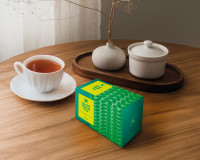According to a recent life cycle assessment* conducted by Metsä Board, food packaging manufacturers can reduce the carbon footprint of their packaging by over 60 per cent by switching from coated recycled paperboard (WLC) to Metsä Board's folding boxboard. The LCA study compares MetsäBoard Classic FBB with equivalent, common alternatives available on the European market. The results have already been verified by the Swedish environmental research institute IVL.
This reduction in the carbon footprint is made possible by the high proportion of fossil-free energy used in Metsä Board's manufacturing process and the low weight of the virgin fibre boards. Although they have the durability and functional properties of conventional grades thanks to the virgin wood fibres used, Metsä Board's folding boxboards are generally lighter than comparable products made from recycled fibres.
"Last year, we carried out verified LCA assessments in three important packaging segments: Cosmetics, pharmaceutical and now food packaging," summarises Anne Uusitalo, Product Safety and Sustainability Director at Metsä Board. "These comprehensive studies provide brand owners with fact-based data and insights into the potential of our paperboards. This helps them make informed decisions about how to reduce the carbon footprint of their packaging and their Scope 3 emissions." In January, Metsä Board published similar audited assessments comparing its products with other paperboards commonly used for cosmetics packaging. In addition, Metsä Board announced last March that verified assessments had been conducted for its paperboard grades used for pharmaceutical packaging.
http://www.metsagroup.com/metsaboard/


